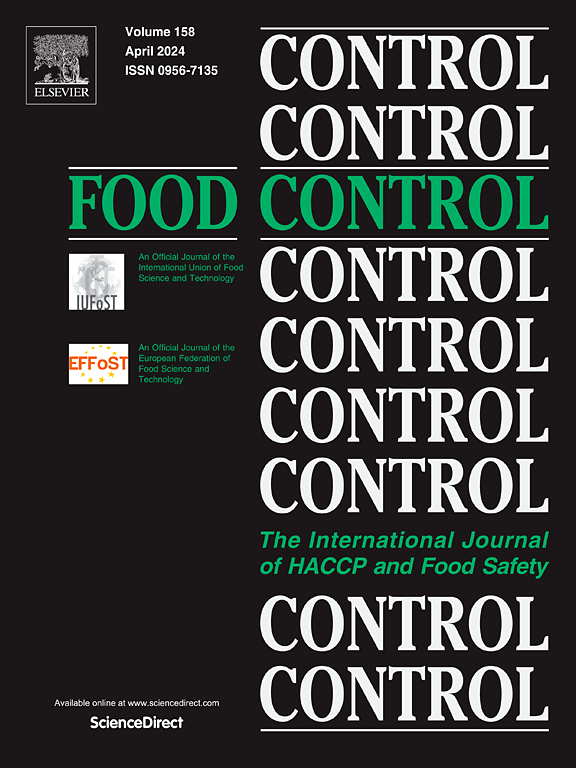Mushroom alcohol treatment inhibited the growth of Alternaria tenuissima and reduced the incidence of postharvest diseases of fresh wolfberry fruit
IF 5.6
1区 农林科学
Q1 FOOD SCIENCE & TECHNOLOGY
引用次数: 0
Abstract
Wolfberry (Lycium barbarum) is an important economic tree species in northwest China. The postharvest decay of fresh wolfberry fruit, caused by infection from Alternaria spp., has become increasingly serious. In this study, the inhibitory mechanism of mushroom alcohol treatment on Alternaria tenuissima was researched using the fumigation method. The results indicated that treatment with mushroom alcohol at a concentration of 0.188 mL/L (50% of maximal effect), effectively inhibited the growth of A. tenuissima mycelium, and reduced biomass and sporulation. Mushroom alcohol treatment increased the activity of superoxide dismutase in A. tenuissima, promoted the accumulation of superoxide anion and hydrogen peroxide in the early stages of culture, inhibited the activity of catalase and polyphenol oxidase, and disturbed the balance of antioxidant metabolism. Furthermore, mushroom alcohol treatment reduced the activity of dehydroascorbate reductase, monodehydroascorbate reductase, and glutathione peroxidase and decreased the amount of antioxidants, resulting in decreased pathogen resistance. The treatment also damaged the cell membrane structure of A. tenuissima, leading to increased relative conductivity, malondialdehyde accumulation, and extensive leakage of nucleic acids and proteins. After the wolfberry was inoculated with the pathogenic fungus, mushroom alcohol treatment significantly reduced wolfberry disease incidence and lesion area. This treatment delayed disease onset and reduced disease severity in harvested wolfberry, suggesting its potential for postharvest fruit preservation.
香菇酒精处理对鲜枸杞鲜果采后病害的发生有抑制作用,对鲜枸杞鲜果采后病害的发生有降低作用
枸杞(Lycium barbarum)是西北地区重要的经济树种。枸杞鲜果采后腐烂是由孢霉侵染引起的,其危害日益严重。本研究采用熏蒸法,研究了香菇醇处理对黄纹霉的抑制机理。结果表明,浓度为0.188 mL/L(最大效果的50%)的香菇醇能有效抑制细纹田径菌菌丝体的生长,减少生物量和产孢量。香菇酒精处理提高了黄芪超氧化物歧化酶活性,促进了培养初期超氧化物阴离子和过氧化氢的积累,抑制了过氧化氢酶和多酚氧化酶的活性,扰乱了抗氧化代谢的平衡。此外,蘑菇酒精处理降低了脱氢抗坏血酸还原酶、单脱氢抗坏血酸还原酶和谷胱甘肽过氧化物酶的活性,降低了抗氧化剂的含量,导致病原菌抗性下降。该处理还破坏了麻草的细胞膜结构,导致相对电导率增加,丙二醛积累,核酸和蛋白质大量泄漏。枸杞接种病原菌后,菌酒精处理显著降低了枸杞病发率和发病面积。该处理延缓了疾病的发生,降低了收获枸杞的疾病严重程度,表明其在采后水果保存方面的潜力。
本文章由计算机程序翻译,如有差异,请以英文原文为准。
求助全文
约1分钟内获得全文
求助全文
来源期刊

Food Control
工程技术-食品科技
CiteScore
12.20
自引率
6.70%
发文量
758
审稿时长
33 days
期刊介绍:
Food Control is an international journal that provides essential information for those involved in food safety and process control.
Food Control covers the below areas that relate to food process control or to food safety of human foods:
• Microbial food safety and antimicrobial systems
• Mycotoxins
• Hazard analysis, HACCP and food safety objectives
• Risk assessment, including microbial and chemical hazards
• Quality assurance
• Good manufacturing practices
• Food process systems design and control
• Food Packaging technology and materials in contact with foods
• Rapid methods of analysis and detection, including sensor technology
• Codes of practice, legislation and international harmonization
• Consumer issues
• Education, training and research needs.
The scope of Food Control is comprehensive and includes original research papers, authoritative reviews, short communications, comment articles that report on new developments in food control, and position papers.
 求助内容:
求助内容: 应助结果提醒方式:
应助结果提醒方式:


